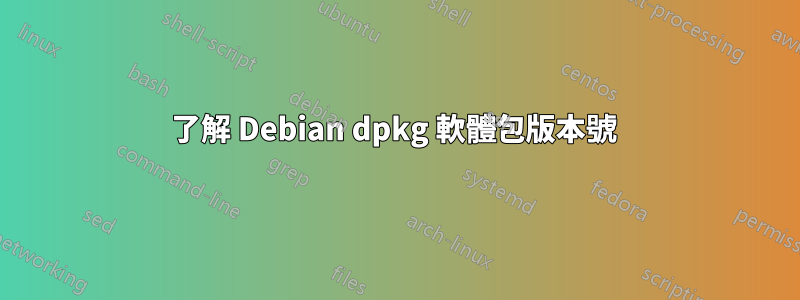
當我輸入 時dpkg -l | grep xserver-xorg,我會得到已安裝的軟體包及其版本的清單:
ii xserver-xorg 1:7.7+3~deb7u1
ii xserver-xorg-core 2:1.12.4-6
ii xserver-xorg-input-evdev 1:2.7.0-1+b1
ii xserver-xorg-input-kbd 1:1.6.1-1+b1
ii xserver-xorg-input-mouse 1:1.7.2-3
ii xserver-xorg-video-radeon 1:6.14.4-8
我想知道冒號前面的數字是什麼意思,即2中的數字2:1.12.4-6
答案1
這Debian 中的版本號具有以下形式
[epoch:]upstream_version[-debian_revision]
在哪裡
epoch是一個(通常很小)無符號整數,包含它是為了允許舊版本包的版本號中出現錯誤。如果省略,則epoch假定為零。upstream_version通常是產生 .deb 檔案的原始原始碼包的版本號。它通常與上游來源使用的格式保持相同。debian_revision根據上游版本指定 Debian 軟體包的版本。它是可選的,並且在專門為 Debian 軟體包編寫軟體的情況下被省略。
答案2
2是時代。
更全面的是,從man deb-version:
[epoch:]upstream-version[-debian-revision]
epoch
This is a single (generally small) unsigned integer. It may be omitted, in which
case zero is assumed. If it is omitted then the upstream-version may not contain
any colons.
It is provided to allow mistakes in the version numbers of older versions of a
package, and also a package's previous version numbering schemes, to be left
behind.
upstream-version
This is the main part of the version number. It is usually the version number of
the original ("upstream") package from which the .deb file has been made, if this
is applicable. Usually this will be in the same format as that specified by the
upstream author(s); however, it may need to be reformatted to fit into the package
management system's format and comparison scheme.
The comparison behavior of the package management system with respect to the
upstream-version is described below. The upstream-version portion of the version
number is mandatory.
The upstream-version may contain only alphanumerics ("A-Za-z0-9") and the
characters . + - : ~ (full stop, plus, hyphen, colon, tilde) and should start with
a digit. If there is no debian-revision then hyphens are not allowed; if there is
no epoch then colons are not allowed.
debian-revision
This part of the version number specifies the version of the Debian package based
on the upstream version. It may contain only alphanumerics and the characters + .
~ (plus, full stop, tilde) and is compared in the same way as the upstream-version
is.
It is optional; if it isn't present then the upstream-version may not contain a
hyphen. This format represents the case where a piece of software was written
specifically to be turned into a Debian package, and so there is only one
"debianisation" of it and therefore no revision indication is required.
It is conventional to restart the debian-revision at '1' each time time the
upstream-version is increased.
Dpkg will break the version number apart at the last hyphen in the string (if there
is one) to determine the upstream-version and debian-revision. The absence of a
debian-revision compares earlier than the presence of one (but note that the
debian-revision is the least significant part of the version number).


